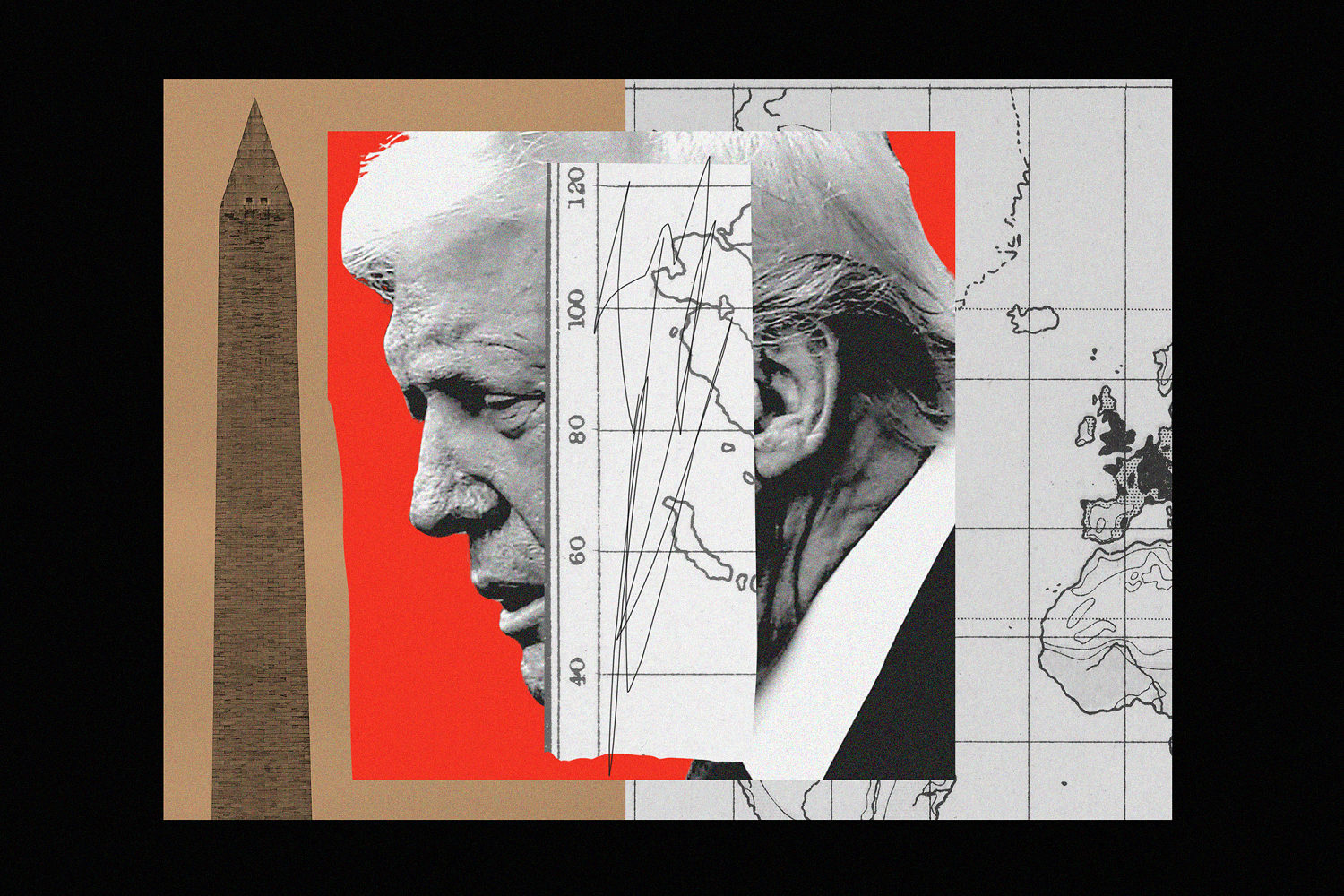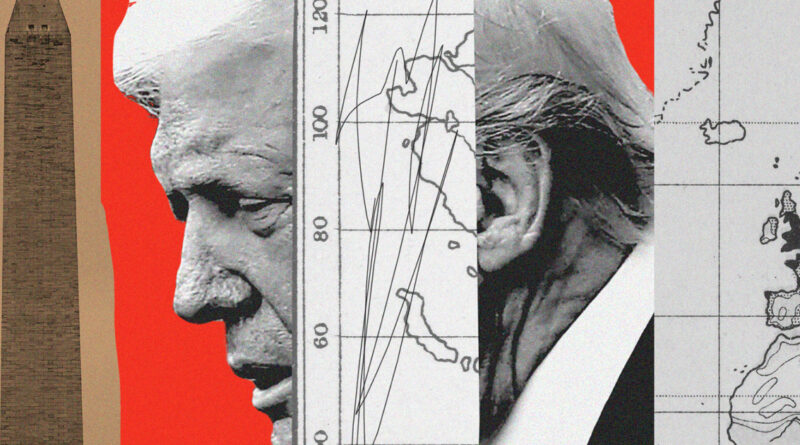Amid escalating global tensions, Trump struggles to be a ‘peacemaker’

WASHINGTON — President Donald Trump is considering a range of options to resolve the worsening conflict in the Middle East, including a possible U.S. military strike against Iran, current and former administration officials said in a fresh sign of rising global tensions on his watch.
Trump cut short his appearance at an international summit meeting in Canada to return to the White House at dawn Tuesday and focus on the shooting war that has broken out between Iran and Israel. In leaving the summit early, he dropped a planned meeting with Ukraine’s leader about the grinding war with Russia, which Trump once pledged to end on his first day in office.
The fast-moving events suggest that global crises are piling up in ways that are impinging other parts of Trump’s agenda.
The stock market — a measure Trump has long viewed as a presidential report card of sorts — fell Tuesday amid the Middle East conflict.
The death toll continues to rise in Gaza as his efforts to mediate a peace deal between Israel and Hamas falter. Though Trump prides himself on a respectful rapport with Vladimir Putin, Russia launched a drone and missile attack on the Ukrainian capital, Kyiv, on Tuesday that killed 15 people and targeted a residential apartment block.
Trump promised during the campaign that he’d be a “peacemaker.” Now he is sounding a more bellicose note as he contemplates just how far to go in helping Israel neutralize the threat from Iran.
“We know exactly where the so-called ‘Supreme Leader’ is hiding,” Trump wrote Tuesday afternoon on Truth Social. “He is an easy target, but is safe there – We are not going to take him out (kill!), at least not for now.”
Trump met with senior officials in the White House Situation Room for about an hour and a half to discuss the war. Throughout the day, he posted further messages on his social media site, in which he aligned himself with Israel as it mounts an aerial attack aimed at wiping out Iran’s nuclear program.
Israel’s assault followed Trump’s effort to reach a diplomatic solution in which Iran would forgo efforts to build a nuclear weapon.
“We now have complete and total control of the skies over Iran,” he wrote on Truth Social, choosing a pronoun that signifies his solidarity with Israel.
“Unconditional surrender!” he wrote in capital letters, without specifying what that would mean, whether it’s regime change in Iran or a deal in which Iran relinquishes its nuclear program.
None of the options that Trump is weighing is easy. Only the United States possesses the large “bunker buster” bombs that can reach Iran’s underground Fordow uranium enrichment site. If Trump were to withhold them from Israel and leave Fordow intact, Iran would still be positioned to build a nuclear arsenal, and he might appear weak. Trump has repeatedly insisted he won’t allow Iran to acquire a nuclear bomb.
Benjamin Netanyahu, Israel’s prime minister, made a case for Trump to intervene militarily in an interview with ABC News.
“Today, it’s Tel Aviv. Tomorrow, it’s New York,” Netanyahu said.
“Look, I understand ‘America First,’” he added, invoking Trump’s foreign policy mantra. “I don’t understand ‘America Dead.’”
If Trump joins in the push to wipe out the Iranian nuclear program, it could alienate parts of the MAGA movement that object to U.S. involvement in far-flung international disputes.
Trump campaigned for a second term promising to be a “peacemaker,” blaming Joe Biden for presiding over a world that was “in flames.”
“Blessed are the peacemakers,” he said in February 2024 during the campaign. “And I promise I will be your peacemaker in more ways than what you would think.”
Similarly, at his inauguration, he said: “My proudest legacy will be that of a peacemaker and unifier. That’s what I want to be: a peacemaker and a unifier.”
Already, there are signs that Trump’s electoral base is splintering. Rep. Marjorie Taylor Greene, R-Ga., a staunch Trump ally, wrote on X that “foreign wars/intervention/regime change put America last, kill innocent people, are making us broke, and will ultimately lead to our destruction.”
The White House didn’t respond to a request for comment.
Vice President JD Vance has stepped in to mend the rift. Long a skeptic of sending U.S. troops into overseas conflicts, Vance wrote on X that Trump “may decide he needs to take further action to end Iranian enrichment.”
“That decision ultimately belongs to the president,” Vance added. “And of course, people are right to be worried about foreign entanglement after the last 25 years of idiotic foreign policy. But I believe the president has earned some trust on this issue.”
A CNBC poll of 1,000 U.S. adults in April found that 53% disapproved of Trump’s foreign policy, compared with only 42% who approved.
Another Middle East option — potentially an off-ramp — is for Trump to leverage the Israeli offensive to persuade Iran to make concessions and abandon any uranium enrichment. Iran has steadfastly refused so far.
“I do think he’s genuinely confused about what his best option is,” said John Bolton, a White House national security adviser in Trump’s first term who is now a staunch critic. “This was not supposed to happen this way. There were supposed to be more negotiations” over dismantling Iran’s nuclear program.
“Trump has lost direction and momentum and being in control of what’s happening, and that rattles him, too,” Bolton added.
Campaigning for a second term, Trump suggested that he had mastered the art of statecraft in ways that would keep the world safe. With his negotiating skills and his personal knowledge of the combatants in Ukraine and Russia, he said, he would end that war immediately. He also vowed that if voters re-elected him, “you’re going to have peace in the Middle East.”
What he has discovered is that both conflicts reflect historical grievance and raw political calculations that don’t vanish when a new president takes power, foreign policy experts said. Presidents often learn that the hard way. Republican former President George W. Bush used the military to try to build a stable, free democracy in Iraq, with limited results.
“There’s a lot of naivete on the part of the president as to what could or couldn’t be done,” said a former Trump administration national security official, who was granted anonymity to speak candidly. “I think he put a lot of stock in his ability to negotiate, and it’s a different world than it was the first time he was in office.”
A second former Trump administration official said: “He has great abilities to negotiate, and he’s proved that from his first term. But here he likely underestimated the internal politics of these conflicts for the different players involved.”
A pair of raging wars in different parts of the world would be tough for any president to manage. An added complication in Trump’s case is that he presides over a turbulent national security team that he doesn’t appear to entirely trust.
Asked about a previous statement by Tulsi Gabbard, his director of national intelligence, that Iran wasn’t building a nuclear weapon, Trump told reporters Tuesday, “I don’t care what she said,” adding that Iran was “very close” to acquiring one.
Rather than rely on the nation’s foreign policy apparatus, Trump has given some of the most sensitive diplomatic assignments to a friend, former real estate magnate Steve Witkoff.
“He’s got one card that he’s playing, and that’s Witkoff. Witkoff does not have a background in this but has his [Trump’s] confidence,” the second former official said. “The whole foreign policy structure has been gutted.”
Trump has pared the National Security Council staff and given Secretary of State Marco Rubio the dual role of also heading the National Security Council, which is supposed to coordinate the work of different agencies and make sure different perspectives are heard.
“Is it a team, or is it a competing set of mutually hostile groups that don’t trust one another?” Daniel Fried, a former U.S. ambassador to Poland, asked rhetorically. “That is not a formula for success.”





